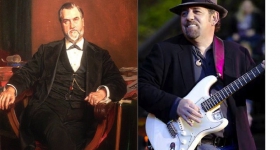The parallel between Japanese internment during World War II and today’s rising Islamophobia is already old news -- but it shouldn’t be, because history insists on repeating itself, and we insist on ignoring it.
During this year's AAPI Heritage Month, the Acting Solicitor General Neal Katyal revealed the following in the Department of Justice blog: In 1944, then solicitor general Charles H. Fahy, who defended Japanese Internment in front of the Supreme Court in Korematsu v. The United States, purposely withheld information that would have exonerated Japanese Americans. To justify his support for internment, Fahy relied instead on generalizations that they were inherently “disloyal and motivated by racial solidarity." These lies about Japanese American loyalties and the glaring omission of evidence was a massive fraud perpetrated against the public, resulting in the imprisonment of 100,000 innocent people.
In 2011, too, we are allowing our national narrative to accuse a minority group monolithically of treason, and to normalize it as a valid opinion. We have the blessing of hindsight, yet the people who represent us are again institutionalizing fear. And although the consequences may not seem as severe as the relocation of thousands of people, an intelligence report by the Southern Poverty Law Center and statements by the Justice Department show a rise in anti-Muslim laws, anti-Muslim violence, and the isolation of Muslim individuals around the country.
It’s not just taking place on a fringe we can dismiss anymore. The current of Islamophobia even amongst mainstream politicians is growing stronger, not slackening:
- This past March, Representative Peter King conducted hearings that sought to root out “home-grown Islamic radicalization” by asserting that Muslim Americans as a whole were not cooperating with law enforcement efforts to combat terrorism.
- Last April, leaders from both political parties expressed opposition to the construction of the Park51 Muslim community center in Manhattan, citing it as insensitive towards victims of 9/11.
- Several states have introduced bills to ban Sharia and international law in American courts.
- On June 13, 2011, a Republican presidential debate allowed prominent political leaders, ones who are vying to represent all of us as a nation, to take the stage and openly claim that Muslims are incapable of loyalty or participation in civic life.
What is most frustrating, is that in doing so they’re creating an underdog fable for themselves, as if their actions are boldly throwing aside political correctness to address an unpopular but dangerous reality. Representative King stated that not to have hearings on the subject of Islamic radicalization would be "a craven surrender to political correctness and an abdication of what I believe to be the main responsibility of this committee [on Homeland Security]."
Yes, terrorist acts have been perpetrated by Muslim Americans here at home -- as well as by Christians, atheists, environmentalists and radicals of every stripe. But the political responses haven't addressed the diverse perpetrators of domestic terrorism. Instead they’ve ignored the fact that the common thread between terrorists is not Islam, but an ideological motivation to place their cause above the laws of this country and the welfare of its citizens through violence and intimidation. If King were truly committed to rooting out radicalization he would have to tackle it in all of its manifestations. After all, if the risk of terrorism was too great for political correctness, then the risk would also be too great to sacrifice thoroughness, regardless of the daunting scope of such an investigation.
The anti-Muslim narrative looks credible because it makes those who scream it seem like they have something to lose by saying something unpopular and brave. Their hysterical arguments have alloyed with the memory of tragic national events, creating a dangerous armor that deflects any criticism by questioning their critics' priorities. Ironically, this martyrdom is imagined, because so far the people telling this story haven’t lost anything. In fact, it’s people who’ve voted against Islamophobic laws in states like Oklahoma who are now coming under fire within constituencies that believe the rhetoric.
Solicitor General Katyal concluded his blog post by emphasizing the importance of candor for leaders who defend the constitution and protect the rights of Americans. Our leaders today who lie to us by perpetuating fear about one minority group are betraying that responsibility. Anti-Muslim leaders aren’t the only ones doing the talking, but their theatrics boast a bigger cast and take up the most space on stage, so they determine the story. The only logical conclusion is that voices committed to truth, and the equally important impassioned appeals to religious freedom and tolerance, are inadequate if they are scarce. So let’s use whatever power we have to urge our elected officials to denounce bigoted policies vocally, and we must support them when they do -- because we cannot afford to be drowned out by the hate.










Comments
This is a point very well taken-- you are certainly right in saying that the Alien and Sedition acts were passed and used long before Japanese internment, so it wasn't a new concept in 1941, and also correct in saying that that Korematsu was never overturned by the Supreme Court. I can't pretend to know if the Alien and Sedition Acts will be used for a legitimate purpose in the future, but Korematsu itself was a deeply flawed ruling based on racial bias, and not evidence.
The meat of my argument was meant to address the exploitation of the acts to intern targeted ethnic populations, without evidence of the group as a whole's guilt, or even in spite of evidence exonerating them. This includes the Japanese, Germans, Italians and any others targeted during WW1 and WW2. Moreover, it was meant to indict leaders today who similarly perpetuate fear and loathing of particular groups even when the evidence doesn't support it.
The past is always relevant if it offers us a chance to look at ourselves more closely-- many leaders in state legislatures and on the national stage would do well to remember these darker periods in our history, as well as derive a little sanity from leaders like President Bush who, even if only for a brief moment, did the right thing by urging Americans not to villify all Muslims because of the sins of a few. Thank you for your comment.